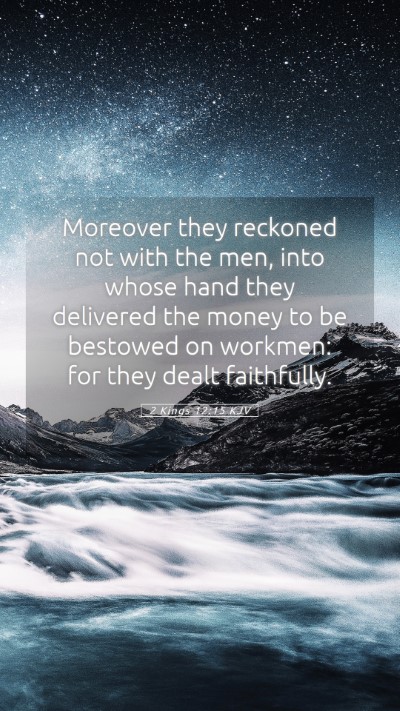Old Testament
Genesis Exodus Leviticus Numbers Deuteronomy Joshua Judges Ruth 1 Samuel 2 Samuel 1 Kings 2 Kings 1 Chronicles 2 Chronicles Ezra Nehemiah Esther Job Psalms Proverbs Ecclesiastes Song of Solomon Isaiah Jeremiah Lamentations Ezekiel Daniel Hosea Joel Amos Obadiah Jonah Micah Nahum Habakkuk Zephaniah Haggai Zechariah Malachi2 Kings 12:15 Meaning
What is the meaning of 2 Kings 12:15?
Moreover they reckoned not with the men, into whose hand they delivered the money to be bestowed on workmen: for they dealt faithfully.
2 Kings 12:15 Bible Verse Meaning
Bible Verse Commentary on 2 Kings 12:15
Verse: “Moreover they reckoned not with the men, into whose hand they delivered the money to be bestowed on workmen: for they dealt faithfully.” (2 Kings 12:15)
Understanding the Verse
This verse highlights the integrity and accountability within the temple operations during King Joash’s reign. It shows a commitment to the building and repair of the temple, emphasizing the significance of honest management of finances intended for sacred purposes. In a broader context, it presents a lesson on trustworthiness and ethical conduct, demonstrating how faithfulness to one’s duties can lead to positive outcomes in communal responsibilities.
Bible Verse Meanings
-
Faithfulness in Service:
Matthew Henry notes that the workers were not scrutinized for the money they received because they proved to be trustworthy in their duties. This reflects how faithfulness in one’s responsibilities can foster a spirit of cooperation and trust among community members.
-
Financial Integrity:
Albert Barnes comments on the importance of handling financial matters with integrity, especially in sacred contexts. The lack of detailed accounts signifies a deeper level of trust placed in the workers, which aligns with God’s expectations for His people to act righteously.
-
Community Trust:
Adam Clarke points out that the verse illustrates a model of communal reliance; when members of a society act with integrity, it builds a robust framework of trust, allowing the community to function effectively. The absence of reckoning with individual workers signifies a collective trust that reinforces unity in purpose.
Bible Verse Interpretations
-
Historical Context:
This verse occurs within a significant rebuilding era under King Joash, focusing on restoring the Temple of the Lord after periods of neglect. Understanding the historical significance of this verse enriches its interpretation, showcasing a time when faith was renewed through action.
-
Significance of Accountability:
The lack of formal accounting highlights a broader theological principle: God values faithfulness over mere meticulous record-keeping. This suggests that God’s economy operates on trust and integrity rather than rigid structures.
-
Application to Daily Life:
This verse encourages readers to reflect on their own dealings—whether financial, personal, or spiritual. It advocates for a lifestyle of integrity and service, urging believers to be trustworthy stewards in every aspect of their lives.
Biblical Exegesis
In-Depth Analysis: This passage dives deep into the themes of stewardship and community responsibility. By examining the practices of the workers, one can explore how biblical principles apply to modern financial stewardship and accountability in congregations. It teaches that when faithful individuals manage resources with care, the collective work of the church flourishes.
Related Cross References
- 2 Chronicles 24:9-12 – This passage discusses the collection and use of money for temple restoration, drawing parallels to the faithful work observed in 2 Kings 12:15.
- Nehemiah 10:39 – It highlights the importance of bringing offerings to the house of God and the responsibilities associated with those resources.
- Matthew 25:21 – This verse illustrates the reward for faithful service, correlating with the trust granted to the workers in the temple.
Bible Study Insights
This exemplary portrayal of communal trust serves as a discussion point for bible study groups. Participants can investigate what it means to be trustworthy in service and how financial stewardship reflects one’s faith commitment. Additional resources, such as bible study guides and bible study tools, can facilitate deeper engagement with the text.
Conclusion
2 Kings 12:15 offers profound bible verse explanations centered around trust, integrity, and the communal ethics of managing resources. It invites readers to consider their personal faithfulness in serving God and others, aligning their life with biblical teachings for a fruitful spiritual walk.


